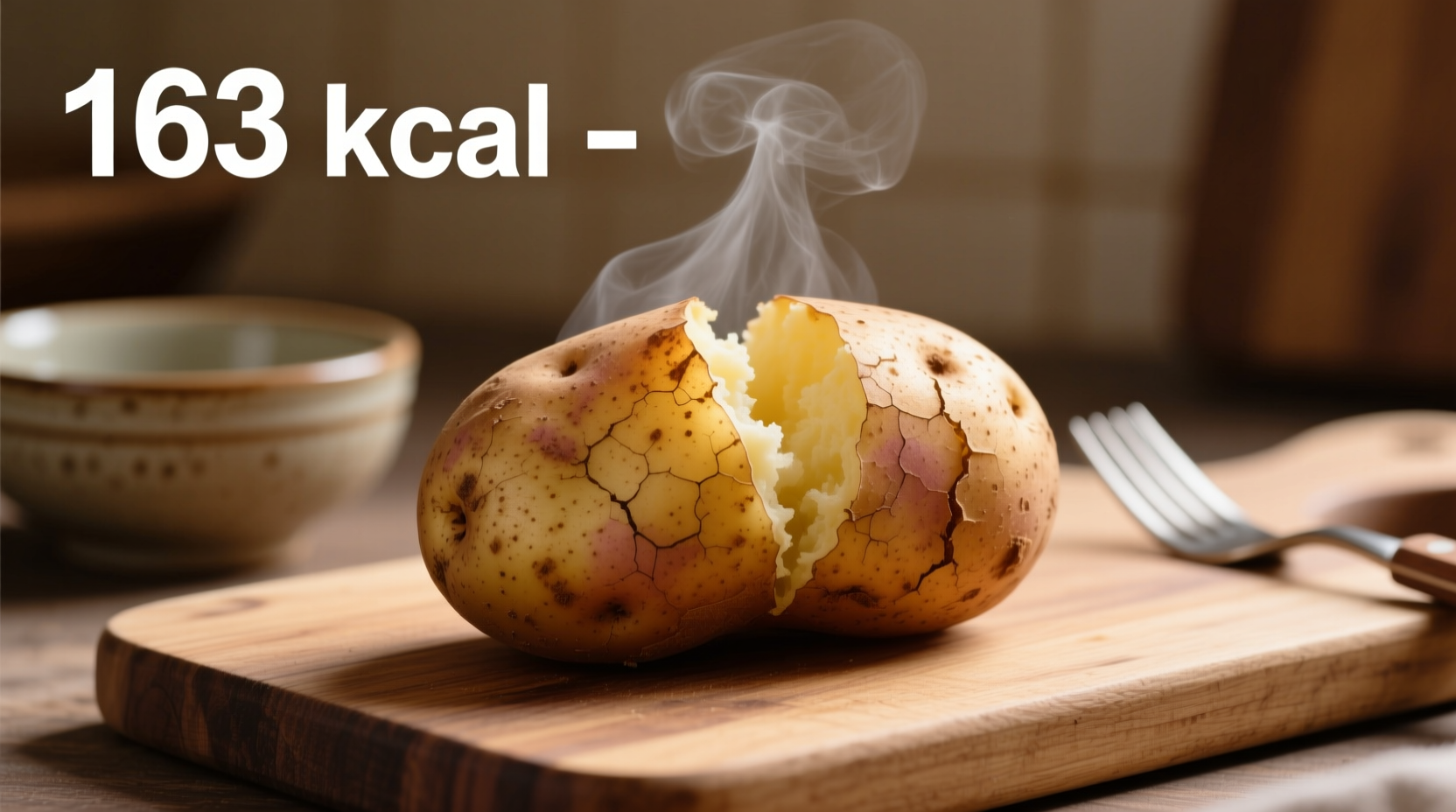Understanding the exact calorie content of baked potatoes helps you make informed dietary choices whether you're managing weight, tracking macros, or simply eating more mindfully. Let's explore the nutritional details that matter most to health-conscious eaters.
What Determines Calorie Count in Baked Potatoes
The calorie count in a baked potato isn't fixed—it varies based on several key factors that affect your actual intake. Knowing these variables helps you track nutrition more accurately.
| Size Category | Weight (grams) | Calories | Carbohydrates | Fiber |
|---|---|---|---|---|
| Small (2" diameter) | 130g | 129 | 29g | 2.1g |
| Medium (2.5" diameter) | 173g | 161 | 37g | 3.6g |
| Large (3" diameter) | 299g | 274 | 63g | 6.3g |
| Jumbo (3.5" diameter) | 369g | 333 | 77g | 7.6g |
Data source: USDA FoodData Central (2023) https://fdc.nal.usda.gov/
This nutritional fact对照表 shows how dramatically portion size impacts your calorie intake. Many restaurants serve potatoes well into the "jumbo" category—equivalent to two full meals' worth of carbohydrates for some dietary plans.
How Preparation Changes Calorie Content
What you do after baking determines whether your potato remains a healthy choice or becomes a calorie bomb. The base potato itself contains zero fat, but common additions transform its nutritional profile:
- Plain baked potato with skin: 161 calories (medium)
- With 1 tbsp butter: Adds 102 calories (total: 263)
- With 2 tbsp sour cream: Adds 56 calories (total: 217)
- With 1 tbsp bacon bits: Adds 22 calories (total: 183)
- Loaded baked potato (restaurant style): Often exceeds 400-600 calories
Research from the US Department of Agriculture confirms that keeping the skin on increases fiber content by 25% while adding minimal calories. The skin contains valuable nutrients like potassium and vitamin C that get lost when peeled.

Why Baked Potatoes Deserve a Place in Balanced Diets
Despite carb-counting trends, registered dietitians increasingly recognize potatoes' nutritional benefits when prepared properly. A medium baked potato provides:
- 37% of your daily vitamin C needs
- 26% of your daily potassium requirement (more than a banana)
- Significant vitamin B6 and magnesium
- Nearly 4 grams of satiating fiber
A 2022 study published in the Journal of Nutrition followed participants who included one plain baked potato daily in their diet for eight weeks. Researchers found no negative impact on blood sugar control among healthy adults when potatoes replaced other refined carbohydrates in meals.
Smart Ways to Enjoy Baked Potatoes Without Calorie Overload
Professional chefs and nutritionists recommend these practical strategies for keeping baked potatoes diet-friendly:
- Choose smaller potatoes (6-8 ounces) as your base portion
- Always keep the skin on for maximum nutrients and fiber
- Top with protein-rich alternatives like Greek yogurt instead of sour cream
- Add flavor with herbs and spices rather than high-calorie fats
- Pair with non-starchy vegetables to balance the meal's glycemic load
As Antonio Rodriguez explains from his professional kitchen experience: "The secret to keeping baked potatoes healthy is treating them as a vehicle for nutrients, not just carbs. When I roast potatoes for my restaurant's menu, I finish them with a squeeze of lemon and fresh herbs—this enhances flavor without adding significant calories while preserving the potato's natural nutritional benefits."
How Baked Potatoes Compare to Other Starchy Sides
When tracking calories, understanding how potatoes stack up against alternatives helps you make informed choices:
- Medium baked potato: 161 calories, 37g carbs
- 1/2 cup cooked white rice: 102 calories, 22g carbs
- 1/2 cup cooked quinoa: 111 calories, 20g carbs
- 1/2 cup mashed potatoes (homemade): 100 calories, 21g carbs
- 1/2 cup macaroni and cheese: 200+ calories, 25g carbs
While potatoes contain more carbohydrates than some alternatives, they also deliver more potassium and vitamin C than most other common starches. The key is portion control and preparation method.
Addressing Common Misconceptions About Potato Nutrition
Several myths persist about potatoes' role in healthy eating. Let's examine the facts:
Myth: Potatoes spike blood sugar dangerously
Fact: When eaten with the skin and paired with protein/fat, potatoes have a moderate glycemic response. Cooling potatoes after cooking creates resistant starch that lowers glycemic impact.
Myth: Sweet potatoes are always healthier than white potatoes
Fact: Both offer unique benefits—white potatoes provide more potassium while sweet potatoes offer more vitamin A. Variety matters more than choosing one "best" option.
Myth: Potatoes lack nutritional value
Fact: Potatoes contain virtually all essential amino acids when eaten with a small amount of protein, making them remarkably complete nutritionally.
Practical Tips for Tracking Potato Calories Accurately
For those monitoring intake closely, these professional tips ensure accurate tracking:
- Weigh potatoes before baking, as water loss during cooking concentrates nutrients but doesn't change calorie content
- Use kitchen scales rather than visual estimates for portioning
- Account for all toppings separately in your tracking
- When eating out, assume restaurant portions are at least "large" size (299g)
- Consider the potato's role in your overall meal composition











 浙公网安备
33010002000092号
浙公网安备
33010002000092号 浙B2-20120091-4
浙B2-20120091-4